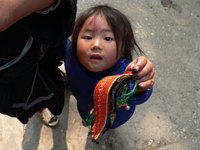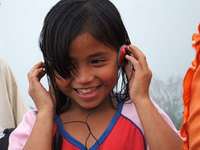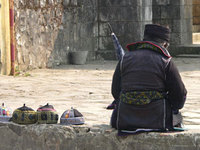When we travel, what sort of footprints do we leave behind?

A Black Hmong kid in Sapa sells handmade craftHere’s how we can get the best out of our sojourns without causing disturbance and disruption to the environment, minimising carbon emissions and maximizing opportunities to enrich people’s lives.
You’re welcome to add on with green travel ideas under Your Say.
Goodie Baggie
- Thought about packing just about enough or less rather than squeezing every possible thing in your bulging luggage? Consider buying those extra clothes needed, especially tees and toiletries at the travel destination itself. Most places have clothes especially tees; Bali and Thailand in particular have wonderful soaps. Your tourist dollar boosts local trade and you get new outfits.
- However, pack a few used clothes, shoes or trinkets that are still nifty but no longer your favourite. You can give them away to the poor or leave them behind in the hotel rooms for the staff to use or distribute.
- Take some gifts with you to give away randomly by consulting travel agents or browsing the web. Ask your friends to help contribute too. It’s the little things that count although candy always goes down well with kids, especially Belgium or Swiss chocolates (if they don’t go gooey where you travel to). Here’s a useful list to remember:
Burma – ballpoint pens (biro) for school kids. I hear kids need these to gain access to school.
India – clothes for children, men and women (conservative wear)
Indonesia - clothes for children, men and women
Vietnam – children’s picture books, English conversational CD and battery-operated CD player.
Thailand – children’s picture books, English conversational CD and battery-operated CD player.
-
Cambodia - mosquito nets, blood donation
-
Please help to build this list.

Indonesian kid hears music through headphones for the first time. Pix by Jeremy Torr.Trippy trappy
- Incorporate a visit to a village or a home , better still, arrange for homestays as part of your getaway. You learn so much more of the local culture by mingling with real people, not just trained tourist operators.
- Pick up a few local phrases , write them down and build them up along the way with your own dedicated language notebook. Also don’t hesitate to teach the residents some words and phrases of your own lingo, helping to strengthen their language skills and confidence in dealing with tourists. Write them down and give them the paper of words and phrases for them to keep.
- Take time to stop and chat with people on the street. Share a smile, a joke or invite them for a cuppa with you. No reason to behave like a tourist just because you are one!

Slow day for this aged Black Hmong lady, Sapa town, VietnamPhoto motto
- Ask permission before you snap a shot of people or their property, and thank them thereafter. If you have a digital camera, show them the shot taken. Don’t be surprised if they are amazed by the image of themselves as they may not have come across a digital camera before.
- In some cities (like Hanoi and ethnic minority villages in Vietnam), you may be asked for money in exchange of photo taken and this you may find out, rather unpleasantly, even after seeking consent. No harm tipping or buying the local handicraft to show your gratitude – it’s definitely quid pro quo!
- If you intend to give, email or snail mail the subject a photo printout, that is wonderful. Remember to keep your promise though to prevent them from being sorely disappointed or worse, disillusioned with trigger-happy and self-seeking tourists.
Shoppa Shocka
- Bargain hunters in third world countries, listen up. There are just two words for you - stop it ! I hear stories of rich tourists boasting of the huge reductions gotten by tough bargaining in poor countries. Remember, haggling for a modest discount is fine but hammering down to cost price is indecent. That extra profit margin made through your purchase may just go a long way to putting one decent food on the table a day or providing warm shoes on kids in blistery winter – things we often take for granted.
- When visiting fairs, markets, street shops, do make it a point to buy something for yourself or your loved one. It’s great to have a souvenir and at the same time, you stimulate local trade.
- If you can’t find something suitable for yourself, consider getting those as Christmas or birthday gifts for others. Buying in advance is cheaper anyway – you won’t burn a huge hole in your pocket come December with mass purchases in super fancy malls. Better still, you will receive compliments on your unique and exotic finds.
- Refrain from purchasing products made from prohibited, endangered or near extinct species of flora and fauna. Say no and if possible, explain the reason to the local tradesmen, who is probably unaware of the environmental threats caused by his actions.